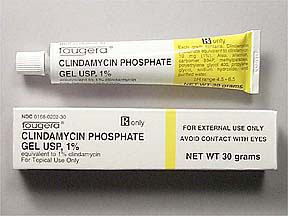
Clindamycin Phos (twice-daily) Coupons & Savings Card – Discount Prices from $10.76
This medication is used to treat acne. It helps to decrease the number of acne lesions. Clindamycin is an antibiotic which works by stopping the growth of bacteria.
Our coupons are free to use. Before paying, show the pharmacist your Clindamycin Phos (twice-daily) savings card to get your free discount. Use our filters below to edit the prescription box to match your needs. The Clindamycin Phos (twice-daily) prices will update based on your prescription needs. Above our Clindamycin Phos (twice-daily) coupons, you can change your location to see pharmacy prices and costs in other areas. We're here to help you buy Clindamycin Phos (twice-daily) at the lowest price with our prescription discount card.
My prescription
Edit
30GM of 1%, Clindamycin Phos (twice-daily) (1 Tube)
Select pharmacy

CVS
$20.05
COUPON PRICE
Walmart
$10.76
COUPON PRICE
Walgreens
$13.83
COUPON PRICE
Albertsons
$19.17
COUPON PRICEClindamycin Phos (twice-daily) savings card
Show this card to your pharmacist
Walmart
$10.76
BIN
ID
PCN
GRP
019876
LHEC720D70
CHIPPO
LHX
Powered by
This medication is used to treat acne. It helps to decrease the number of acne lesions. Clindamycin is an antibiotic which works by stopping the growth of bacteria.
Our coupons are free to use. Before paying, show the pharmacist your Clindamycin Phos (twice-daily) savings card to get your free discount. Use our filters below to edit the prescription box to match your needs. The Clindamycin Phos (twice-daily) prices will update based on your prescription needs. Above our Clindamycin Phos (twice-daily) coupons, you can change your location to see pharmacy prices and costs in other areas. We're here to help you buy Clindamycin Phos (twice-daily) at the lowest price with our prescription discount card.
